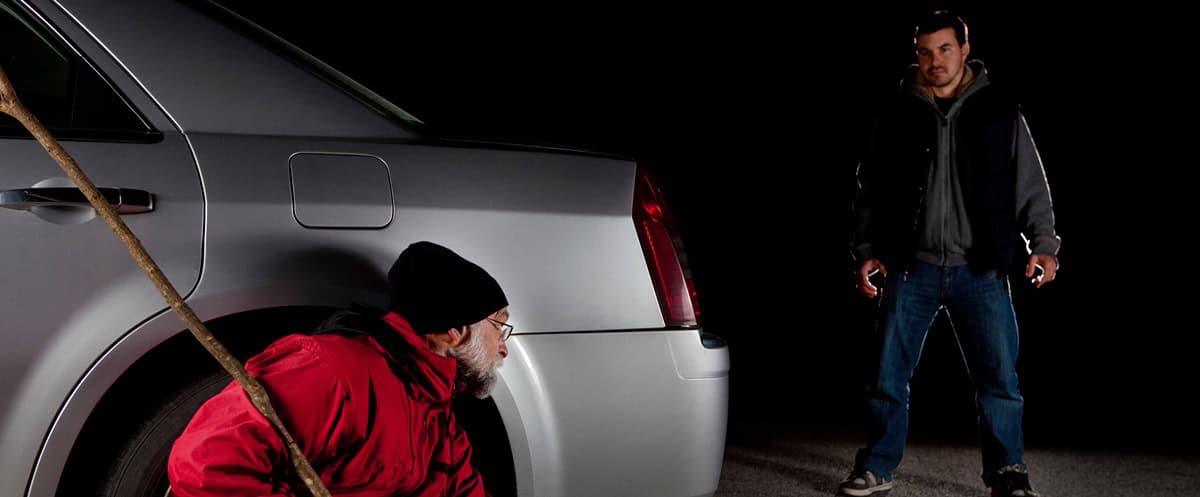Listen To This Page:
Quick Navigation:
- Explaining Arizona Revised Statute 13-1404
- What are the Terms Reasonable, Proportional, and Immediately Necessary?
- Does Arizona Have Stand Your Ground Laws
- When is The Use of Physical Force/ Deadly Force Allowed
- When is the Protection of a Third Party Justified
- Using Force to Protect Property and Premises
- Contact an Experienced Criminal Defense Attorney
In the state of Arizona, self-defense is recognized as a legal right under ARS 13-404. This statute allows individuals to use physical force, including deadly force, to protect themselves or others from imminent harm.
However, the key to justifying self-defense under Arizona law lies in whether the individual reasonably believed that the use of physical force was necessary to prevent injury or death.
Under the guidance of experienced attorneys from Colburn Hintze Maletta, individuals can handle the complexities of self-defense laws in Arizona and ensure their actions are legally justified. Understanding when it is permissible to act in self-defense can mean the difference between facing criminal charges or being exonerated for protecting oneself or others.
Get Immediate Help from Our Criminal Defense Attorneys.
We are Available to Talk Now.
Or, Continue Reading Below About:
When is Self-Defense Justified
Explaining Arizona Revised Statute 13-1404
Arizona Revised Statute 13-404 outlines when an individual is justified in using or threatening physical force in self-defense. Here, we’ll break down the specific provisions of this statute to clarify its application in potential self-defense scenarios.
Subsection A: Justification of Physical Force
Subsection A of ARS 13-404 states:
“A person is justified in threatening or using physical force against another when and to the extent a reasonable person would believe that physical force is immediately necessary to protect himself against the other’s use or attempted use of unlawful physical force.”
This part of the statute establishes conditions under which physical force is permitted. It emphasizes that the perception and response must be considered reasonable by an average person under similar circumstances, and the necessity for force must be immediate, responding directly to an unlawful threat.
Subsection B: Limitations on the Justification of Physical Force
Subsection B outlines specific situations where the use of physical force is not justified:
- Verbal Provocation: The law is clear that verbal provocation alone does not justify the use of physical force. This provision aims to prevent escalations based on insults or threats that do not pose an immediate physical danger.
- Resisting Arrest: The statute also specifies that physical force is not justified in resisting arrest—whether the arrest is lawful or unlawful—conducted by a peace officer or someone acting under an officer’s direction.An exception exists if the force used by the peace officer exceeds legal limits, allowing the individual to defend themselves against excessive force.
- Provocation by the Defender: If a person provokes an attack, they generally cannot claim self-defense under this statute. However, there are exceptions if the provocateur:
- Withdraws from the situation or communicates an intent to withdraw, and
- Believes they cannot safely leave, yet the other party continues or attempts to continue using unlawful physical force.
What are the Terms Reasonable, Proportional, and Immediately Necessary?
Understanding the terms “reasonable,” “proportional,” and “immediately necessary” is important for interpreting Arizona Revised Statute 13-404 on self-defense. Each term sets specific legal standards that determine the justification of using physical force in defensive situations.
Reasonable
The term “reasonable” refers to what an average person with similar knowledge and circumstances would deem appropriate under the same situation.
This standard is subjective and varies depending on the specifics of each case.
Imagine a person is approached aggressively in a parking lot by another individual wielding a baseball bat. If the person believes they are about to be attacked and pushes the aggressor away to escape harm, their action would likely be considered reasonable, as most people would deem such a defensive reaction appropriate under the circumstances.
Proportional
“Proportional” means the level of force used in defense must not exceed what is necessary to counteract the threat.
Excessive force, beyond what is needed to ensure safety, is not justified.
If someone slaps another individual during a heated argument, and the slapped individual responds by pulling out a knife and stabbing the aggressor, the response would not be considered proportional. While defense against a slap might justify returning physical force, escalating to lethal force is disproportionate to the initial threat.
Immediately Necessary
“Immediately necessary” implies that the action is required at that very moment to prevent harm.
It cannot be premeditated or delayed; it must be a direct response to an imminent threat.
Suppose a person is being chased by another who is shouting threats and attempting to strike them with a stick. If the chased individual turns around and sprays the aggressor with pepper spray when they catch up, the use of force could be deemed immediately necessary to prevent imminent physical harm.
Does Arizona Have Stand Your Ground Laws
“Stand Your Ground” laws allow individuals to use force, including deadly force, in self-defense when they believe such force is necessary to prevent imminent harm or death.
These laws remove the duty to retreat, which means that a person does not have to attempt to escape the situation before using force to defend themselves.
This aspect is what primarily distinguishes “Stand Your Ground” laws from other self-defense laws that may require a person to retreat if safely possible.
In Arizona, the “Stand Your Ground” law is embodied in Arizona Revised Statutes, which states that a person has no duty to retreat before threatening or using physical force if they are in a place where they have a right to be and are not engaged in an unlawful act. This provision applies even if retreat could have avoided the confrontation.
When is The Use of Physical Force/ Deadly Force Allowed
In Arizona, the law delineates guidelines regarding when physical and deadly force may be legally used. Both types of force are governed by specific statutes designed to ensure that individuals only resort to such measures under appropriate and justified circumstances.
Physical Force
Physical force may be used under Arizona law in the following situations:
- Self-Defense: When a person reasonably believes that such force is necessary to protect themselves against another’s use or attempted use of unlawful physical force.
- Defense of Another: When a person reasonably believes that physical force is necessary to protect another person who is threatened with unlawful physical force.
- Prevention of Crime: Physical force can be used to prevent certain crimes, particularly those involving a threat to physical safety, such as robbery or sexual assault.
Deadly Force
Deadly force is justified under more restricted circumstances, primarily to protect against a threat of imminent death or serious physical injury:
- Self-Defense from Deadly Threat: When a person reasonably believes that deadly force is immediately necessary to protect themselves against another’s use or attempted use of unlawful deadly physical force.
- Preventing Specific Felonies: Deadly force can be used to prevent the commission of a violent felony, such as armed robbery, rape, or murder.
Legal Limitations
Both uses of force come with legal limitations:
- Proportionality: The force used must be proportional to the threat. Deadly force is not justified in response to a non-lethal threat.
- No Duty to Retreat: Arizona’s “Stand Your Ground” law stipulates that there is no duty to retreat before using force if you are in a place where you have a legal right to be and are not engaged in illegal activity.
- Engagement in Unlawful Activities: Individuals engaged in unlawful activities at the time cannot justify their use of physical or deadly force under self-defense.
When is Protection of a Third Party Justified
In Arizona, the law provides specific guidance on when an individual is justified in using physical or deadly force to protect a third party. According to Arizona Revised Statutes 13-406, a person may threaten or use physical force, including deadly force, to protect another individual if the circumstances would justify them using similar force to protect themselves under the same conditions.
Application of the Law: If, for example, you witness a person being attacked and you believe that the attacker is using or about to use deadly force against the victim, you are justified in using comparable force to intervene if you reasonably believe that similar force would be necessary to protect yourself in that situation. This could involve using physical force to restrain the attacker or, if the threat is deemed deadly and imminent, using deadly force to protect the third party.
This legal provision ensures that individuals can take action to protect others when they reasonably believe that the situation calls for it, mirroring the protections they would have if they were the direct targets of the threat.
Using Force to Protect Property and Premises
In Arizona, the use of physical force to protect property and premises is addressed under specific legal provisions. Understanding when and how such force can be legally applied is essential for property owners and individuals in control of any premises.
Protection of Tangible Movable Property
According to Arizona Revised Statutes 13-408, an individual is justified in using physical force against another to prevent theft or criminal damage involving tangible movable property under their control.
The use of force must be what a reasonable person would deem necessary to prevent the commission or attempted commission of these crimes.
However, it’s important to note that while physical force can be used to protect property, deadly physical force is not justified under this statute unless it conforms to the conditions outlined in ARS 13-405, 13-406, and 13-411, which generally relate to protecting oneself or others from physical harm or death.
Defense Against Criminal Trespass
The statutes extend further protections under ARS 13-407, which allows individuals or their agents who are in lawful possession or control of premises to use physical force, and under specific circumstances deadly force, to prevent or terminate a criminal trespass.
- Physical Force: Can be used to stop someone from unlawfully entering or attempting to enter or remain on property controlled by the person using the force.
- Deadly Physical Force: Can only be used under the conditions similar to those for protecting oneself or others, specifically if the trespasser poses a threat of physical harm or death.
Definition of Premises
For the purposes of these statutes, “premises” include any real property and any structure, whether movable or immovable, permanent or temporary, and adapted for human residence or lodging, regardless of whether it is occupied.
Contact an Experienced Criminal Defense Attorney
If you’re facing a criminal case where self-defense is a key strategy, it’s important to have experienced legal representation. The attorneys at Colburn Hintze Maletta specialize in self-defense cases under Arizona law. They understand the specific legal challenges these cases present and offer practical advice and representation.
For those in need of immediate legal assistance, contacting CHM can make a significant difference in the outcome of your case. For more information or to schedule a consultation, call them directly at (602) 825-2500.

David Maletta is a widely respected criminal defense attorney with over 23 years of experience and has worked on over 1,000 cases and has successfully won over 100 jury trials. David graduated from Northern Arizona University, Magna Cum Laude in 1993 with a degree in Psychology. Shortly thereafter, he earned his Juris Doctor degree from Seton Hall University School of Law in 1998. He has extensive experience in criminal and DUI matters, homicide, sexually-based offenses, domestic violence, white-collar crimes, and various misdemeanor crimes.
Always Available 24/7 for Legal Help
Schedule an Appointment Today!
Call Us Now to Speak with an Attorney (602) 825-2500
Real Client Reviews
Below are just a few of what our clients have to say!












